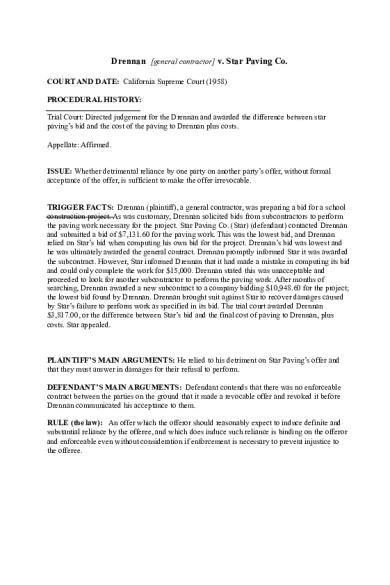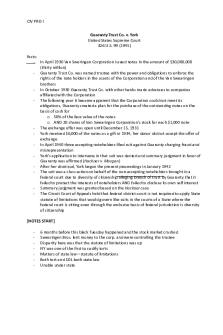Drennan v. Star Paving Co. PDF

| Title | Drennan v. Star Paving Co. |
|---|---|
| Course | Contracts |
| Institution | Boston College |
| Pages | 2 |
| File Size | 89.3 KB |
| File Type | |
| Total Downloads | 20 |
| Total Views | 143 |
Summary
Brief...
Description
Drennan [general contractor] v. Star Paving Co. COURT AND DATE: California Supreme Court (1958) PROCEDURAL HISTORY: Trial Court: Directed judgement for the Drennan and awarded the difference between star paving’s bid and the cost of the paving to Drennan plus costs. Appellate: Affirmed. ISSUE: Whether detrimental reliance by one party on another party’s offer, without formal acceptance of the offer, is sufficient to make the offer irrevocable. TRIGGER FACTS: Drennan (plaintiff), a general contractor, was preparing a bid for a school construction project. As was customary, Drennan solicited bids from subcontractors to perform the paving work necessary for the project. Star Paving Co. (Star) (defendant) contacted Drennan and submitted a bid of $7,131.60 for the paving work. This was the lowest bid, and Drennan relied on Star’s bid when computing his own bid for the project. Drennan’s bid was lowest and he was ultimately awarded the general contract. Drennan promptly informed Star it was awarded the subcontract. However, Star informed Drennan that it had made a mistake in computing its bid and could only complete the work for $15,000. Drennan stated this was unacceptable and proceeded to look for another subcontractor to perform the paving work. After months of searching, Drennan awarded a new subcontract to a company bidding $10,948.60 for the project; the lowest bid found by Drennan. Drennan brought suit against Star to recover damages caused by Star’s failure to perform work as specified in its bid. The trial court awarded Drennan $3,817.00, or the difference between Star’s bid and the final cost of paving to Drennan, plus costs. Star appealed.
PLAINTIFF’S MAIN ARGUMENTS: He relied to his detriment on Star Paving’s offer and that they must answer in damages for their refusal to perform. DEFENDANT’S MAIN ARGUMENTS: Defendant contends that there was no enforceable contract between the parties on the ground that it made a revocable offer and revoked it before Drennan communicated his acceptance to them. RULE (the law): An offer which the offeror should reasonably expect to induce definite and substantial reliance by the offeree, and which does induce such reliance is binding on the offeror and enforceable even without consideration if enforcement is necessary to prevent injustice to the offeree.
HOLDING + REASONING: Yes. Star should have reasonably expected Drennan to rely on its bid when making his own bid, and Drennan did rely on the bid such that enforcement of the terms of Star’s bid is necessary to prevent injustice to Drennan. An offer which the offeror should reasonably expect to induce definite and substantial reliance by the offeree, and which does induce such reliance is binding on the offeror and enforceable even without consideration if enforcement is necessary to prevent injustice to the offeree. When reasonable reliance on the offer by the offeree results in a foreseeable negative change in the offeree’s position, a promise not to revoke the offer is implied on behalf of the offeror. This reasonable reliance serves a substitute for the consideration ordinarily required to form a bilateral contract. It thus does not matter that Drennan provided no consideration for the agreement between himself and Star, as it was reasonably foreseeable for Star that Drennan would rely on its bid if it was the lowest bidder. It was in Star’s business interests for Drennan to rely on its bid, as doing so resulted in Drennan winning the general contract and Star winning the subcontract. Additionally, it does not matter that Star made a mistake in calculating its bid, as it had a duty to exercise reasonable care in bid preparations. This duty of care is heightened by the fact that the negative consequences for Drennan stemming from an erroneous subcontractor bid were reasonably foreseeable to Star. Finally, Drennan could not reasonably know that Star made an erroneous bid, as there is often significant variation among subcontractor bids. Star should have reasonably expected Drennan to rely on its bid when making his own bid, and Drennan did rely on the bid such that enforcement of the terms of Star’s bid is necessary to prevent injustice to Drennan. Drennan already fulfilled his duty to mitigate damages by searching for months for the next lowest bidder, and thus the trial court’s award of $3,817.00, or the difference between Star’s bid and the final cost of paving to Drennan, is affirmed....
Similar Free PDFs

Drennan v. Star Paving Co.
- 2 Pages

Nanakuli Paving and Rock Co
- 2 Pages

Morsi v. Fermar Paving Ltd
- 3 Pages

Guaranty Trust Co. v. York
- 4 Pages

Pennsylvania Coal Co. v. Mahon
- 2 Pages

Midler v Ford Motor Co
- 4 Pages

Richmond v. J.A. Croson Co
- 2 Pages

More star examples - STAR
- 4 Pages

Hecht v. Andover Assoc. Mgmt. Co
- 3 Pages

Carlill v Carbolic Smoke Ball Co
- 2 Pages
Popular Institutions
- Tinajero National High School - Annex
- Politeknik Caltex Riau
- Yokohama City University
- SGT University
- University of Al-Qadisiyah
- Divine Word College of Vigan
- Techniek College Rotterdam
- Universidade de Santiago
- Universiti Teknologi MARA Cawangan Johor Kampus Pasir Gudang
- Poltekkes Kemenkes Yogyakarta
- Baguio City National High School
- Colegio san marcos
- preparatoria uno
- Centro de Bachillerato Tecnológico Industrial y de Servicios No. 107
- Dalian Maritime University
- Quang Trung Secondary School
- Colegio Tecnológico en Informática
- Corporación Regional de Educación Superior
- Grupo CEDVA
- Dar Al Uloom University
- Centro de Estudios Preuniversitarios de la Universidad Nacional de Ingeniería
- 上智大学
- Aakash International School, Nuna Majara
- San Felipe Neri Catholic School
- Kang Chiao International School - New Taipei City
- Misamis Occidental National High School
- Institución Educativa Escuela Normal Juan Ladrilleros
- Kolehiyo ng Pantukan
- Batanes State College
- Instituto Continental
- Sekolah Menengah Kejuruan Kesehatan Kaltara (Tarakan)
- Colegio de La Inmaculada Concepcion - Cebu





